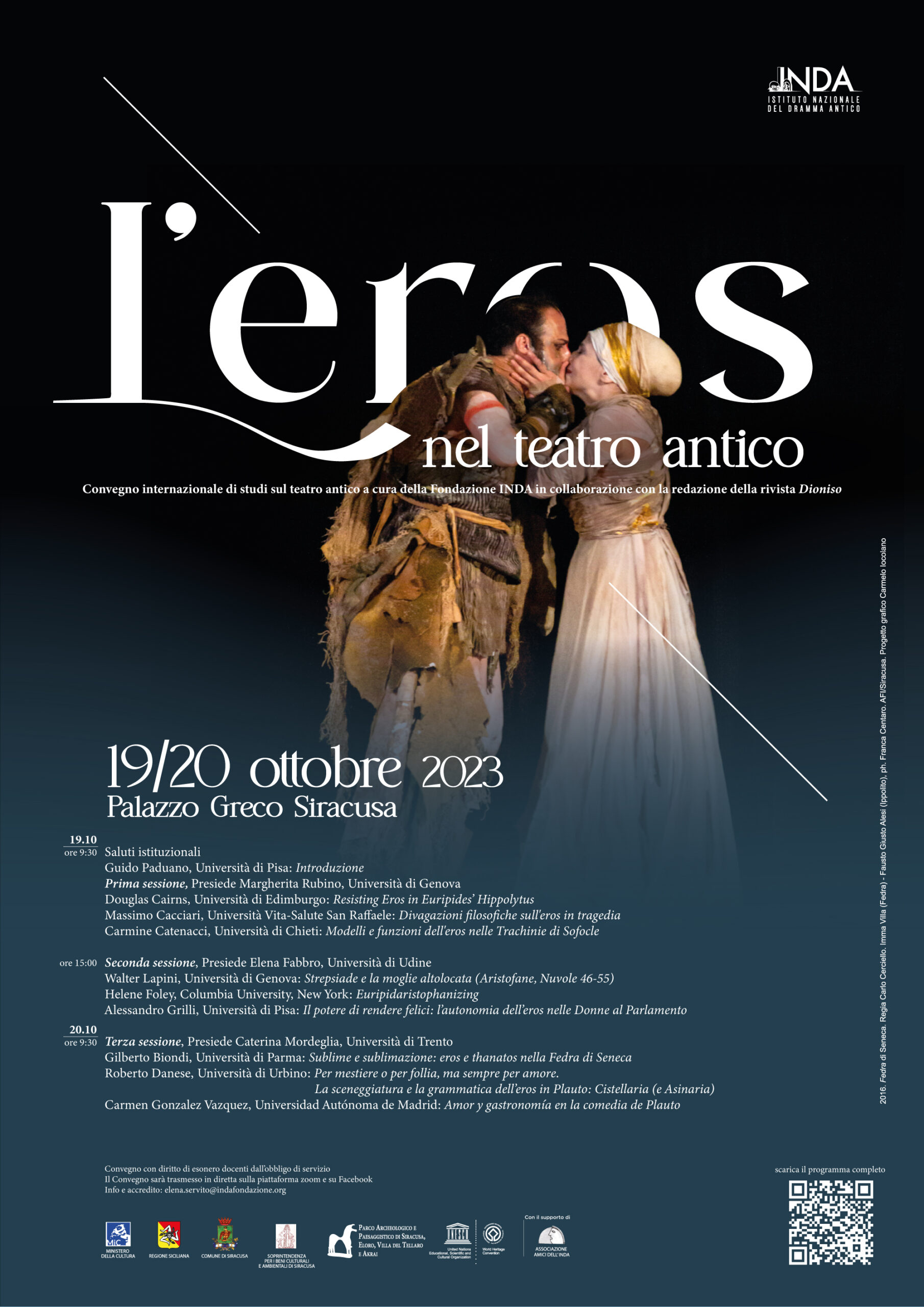19-20 October 2023
Palazzo Greco, INDA Foundation Syracuse
Of the pendulum between repressed and repression, Euripides’ Hippolytus provides an exemplary scenic representation: having fallen in love with her stepchild Hippolytus for a revenge that the goddess Aphrodite wants to take on him, not on her, Phaedra experiences her passion not as pure desire, but as a tension between the uncontrollable divine impulse and the all-too-human qualms of ethics: eros thus struggles mightily to prevail over the barriers of silence, but the very duration of resistance sanctions its centrality, which Racine’s rewriting will transmit to European culture.
In Greek tragedy, a sexophobic moralism is pervasive: the pains and misdeeds of love are always vigorously denounced, while its rare thaumaturgies on the positive side are somewhat neutralised.
Euripides’ Alcestis stages the death of a woman who dies in place of her husband Admetus, the recipient of a fable-like privilege; it is understood that Plato in the Symposium made her the very icon of eros. But in Euripides, Alcestis does not describe the motive of her action in the same way, as she seems to frame it in a bland and generic regime of family affectivity; when on the point of death she asks Admetus not to remarry, she declares that she does so in order not to give her children a stepmother.
In the Supplices, also by Euripides, Evadne throws herself on the stake of her husband Capaneus, but since her sacrifice is ‘useless’, the exaltation is all subjective, clashing with the respectable moralism of her father Iphis.
When the theme of love returns in Seneca, it has one more adversary, the Stoic condemnation of passions, and on the other hand it gains prominence in the tragic action: for instance in his Phaedra, the protagonist kills herself not to slander her beloved and take revenge for his refusal, but to unite their fata, since it was impossible to unite their animos.
Moving on to the horizon of comedy, in Aristophanic drama, the erotic drive is not censored because no drive is censored: the comic message conveys a narcissistic desire for absolute, cosmic happiness, of which sex is an integral part, but not a prominent one: on the whole it plays a lesser role than, for example, the desire for food.
In Lysistrata, however, a reorganisation of the relationship between sexes is affirmed that gives the preponderant part to female desire, endowed with the same strength as male desire, but assisted by a far-sighted project and a lucid awareness of values: male desire is indeed, through the notorious sex strike, used as a political instrument, in a line of thought that affirms the incompatibility of love (and family affectivity) with the unreasonable universe of violence and war.
One is the quest for ‘bourgeois’ marriage that has to overcome obstacles linked to economic and social inequalities, to character peculiarities, to events that have created misunderstandings about people’s identity.
The other one, far more problematic, is aimed at a wholly or predominantly mercenary object of desire, and has as its adversary the patriarchal authority in the dual role of guardian of values and (even more so) of wealth. The assault on authority is carried not in the first person by the young man, but by a slave who solidarises with him and who exercises the intellectual dimension of cheating with such mastery as to attain the status of a demiurgic character (equated, in a famous passage from Plautus’ Pseudolus, with the poet’s own creativity).
It is clear that this victory of sex needs to be exorcised, a result that is often achieved by discrediting not the patriarchal institution but the individual fathers who unworthily represent it, and their unworthiness is revealed by the fact that they in turn fall in love, without being entitled to the ‘paternalistic’ indulgence that young people are entitled to.
Editor in chief, Dioniso
Eros in
Ancient
Drama
INDA International Study Conference 2023
organised by the Inda Foundation and the Journal of Ancient Theatre Studies Dioniso.
19 October
Institutional greetings
Guido Paduano, Università di Pisa: Introduction
09:30 hours
First session
Presiede Margherita Rubino
Università di Genova
Douglas Cairns
University of Edinburgh: Resisting Eros in Euripides’ Hippolytus
Massimo Cacciari
Università Vita e Salute: L’Alcesti di Euripide
Carmine Catenacci
Università di Chieti: Modelli e funzioni dell’eros nelle Trachinie di Sofocle
15.00 hours
Second session
Chaired by Elena Fabbro
University of Udine
Walter Lapini
University of Genoa: Strepsiade e la moglie altolocata ( Aristofane, Nuvole 46-55)
Helene Foley
Columbia University, New York: Euripidaristophanizing
Alessandro Grilli
University of Pisa: Il potere di rendere felici: l’autonomia dell’eros nelle Donne al Parlamento
20 October
Third session
Chaired by Caterina Mordeglia
University of Trento
Gilberto Biondi
University of Parma: Sublime and sublimation: eros and thanatos in Seneca’s Phaedra
Roberto Danese
University of Urbino: Per mestiere o per follia, ma sempre per amore.
La sceneggiatura e la grammatica dell’eros in Plauto: Cistellaria (e Asinaria).
Carmen Gonzalez Vazquez
Universidad Autónoma de Madrid: Amor y gastronomía en la comedia de Plauto
Organisational secretariat
Elena Servito, Francesco Morosi
Press Officer
Gaspare Urso
Graphic design
Carmelo Iocolano
[email protected]
+39 0931 48 72 26
“Conference with exemption from duty”.
The conference will be broadcast on zoom and facebook platforms

